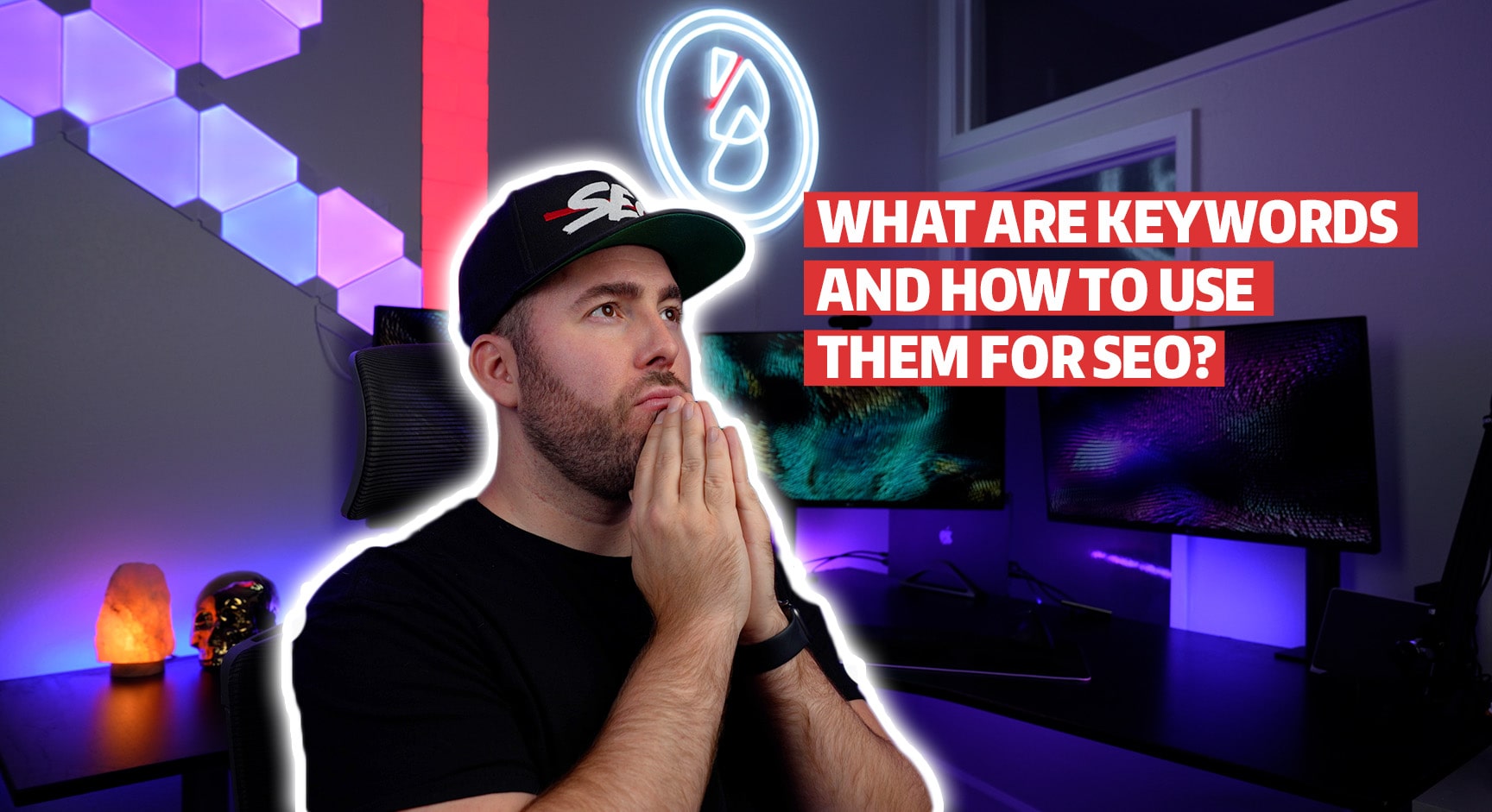Whenever you search for something on Google or other search engines, you insert certain words and phrases, also known as keywords. Both individual words like “Australia” as well as phrases like “best time to travel to Australia” are considered keywords.
Generally, people refer to keywords as queries or Google searches unless they work in digital or content marketing or in the SEO industry. But why are keywords important and how exactly can you use them for SEO? Read on to find out in this comprehensive guide!
Why Are Keywords Important?
As a business owner, your online presence is essential and keywords are one of the premier ways for people to organically find you – whether intentionally or unintentionally. For example, if you searched for “what are keywords?”, a keyword phrase that gets about 1,600 monthly searches, you would come across this article.
That means, strategically using keywords on your website or in your blog posts can help increase your web traffic and help you rank higher on Google.
How to Appear in Google for Keywords
Now that you know the importance of keywords, here’s how you can use them to increase website traffic and grow your business:
- PPC (Pay Per Click) advertising
- SEO (Search Engine Optimization)
Pay-Per-Click (PPC)
You can pay Google to show your website at the top of search results for certain keywords – this is known as PPC or pay-per-click advertising. However, people will know that you paid to appear on Google as your site will be marked as an ad in search results. Every time someone clicks on your website through this ad, you will be charged.
Search Engine Optimization (SEO)
Search engine optimization, or SEO, refers to the process of optimizing your website to organically rank in Google’s search results. The better Google deems your site for certain queries, the higher it will rank, resulting in lots of organic website traffic for you.
How to Find Keywords
While you may have a few keywords in mind to try and rank for, you should use a keyword research tool to find out all the relevant terms and questions people are actually searching for.
To get to this article, for example, you may start with seed keywords like “keyword,” and “SEO.” A keyword research tool like SemRush would then tell you that people are also using queries like “how to use keywords for SEO,” “how to rank higher on Google”, or “how to rank website on Google.”
How to Choose Keywords
While it’s impossible to rank for or bid on every keyword, you can use a few important metrics and attributes to help you choose which ones are the best for you, including:
- Search volume
- Search intent
- Value
- Keyword Difficulty
Search Volume
Your preferred keyword research tool allows you to check for the monthly search volume of each keyword. For example, the keyword “how to choose keywords for SEO” gets 320 monthly searches while the question “what are keywords?” gets 1,600 monthly searches. Use both but prioritize the one that gets more searches.
In addition, make sure that the keywords you choose are relevant to your business so that users won’t just click on your website in search results, but also stay, browse through it and become paying customers.
Search Intent
One of the most important parts of choosing keywords is to create content that aligns with search intent. That means, instead of trying to rank your website for any high-volume keyword, make sure that people who are using this query are actually looking for what you offer.
Oftentimes, users will insert product keywords to look up reviews or blog posts to learn more. You can tell what users want by inserting a keyword into Google Search and looking at the top-ranking sites. Keep this in mind when you select your own keywords.
Value
Search volume and intent are not the only important metrics. You also have to consider keyword value.
Whenever you assess a keyword’s value, look at its CPC (cost per click) tab in your keyword research tool. The CPC tells you how much, on average, advertisers pay for a click resulting from that keyword. In other words, the more advertisers are willing to pay for a keyword, the higher its value.
However, remember that a keyword’s perceived value is not the same for everyone. For example, the keyword “SEO keyword research services” has a CPC of 11.26. That means you can earn quite a bit of money with SEO keyword research services and those that offer these services are willing to pay to attract traffic. But if that’s not a service you sell, that keyword won’t be valuable for you.
Keyword Difficulty
The last metric to look at is keyword difficulty. Let’s say you found a keyword that fits perfectly into your content, matched search intent, and had high monthly searches, and value – this is a keyword to use, right?
Well, that depends on whether it’s difficult to rank for. The KD % tab will tell you each keyword’s level of difficulty. For example, the keyword “SEO keywords” has 3,600 monthly searches, a CPC of 3.92 but a keyword difficulty level of 97 (on a scale of 0 – 100), which is marked red.
Any KD % that is red is considered high and keywords that are difficult to rank for simply mean that there are lots of high-ranking websites that have backlinks from high-quality websites. Backlinks are essential when it comes to ranking, so if you try to compete with these sites for a certain keyword but without any high-quality links from other sites, you likely don’t stand a chance.
Still, backlinks are not everything when it comes to ranking in Google Search.
How to Optimize for Keywords
Keyword optimization is another important aspect when working on your SEO strategy. Here’s an overview of what most people believe is necessary to optimize for keywords:
- Include the keyword in the title tag
- Include the keyword in the URL
- Include long-tail keywords in your copy
- Mention your keyword throughout your page
While these are all elements to focus on, they’re not the main way of optimizing for keywords as the main way to optimize for a keyword is to match search intent. Although that was already brought up earlier, it’s important to highlight how incredibly essential this is.
For example, if you write a blog post about “oven toasters” and try to rank for that keyword, it most likely won’t get you any organic traffic. That’s because most people that search for oven toasters are actually looking to buy one, not to read blog articles about them.
Again, you can find out what most users are looking for by inserting a keyword you want to rank for in Google and looking at the top-ranking results.
In addition to matching search intent, you’ll also have to write about the things that users are expecting to see when they come across your site for a certain keyword. For example, if you wanted to rank for “keywords,” you’d see right away from the top-ranking results that people want free keyword research tools to help them find the right keywords for their websites and blogs.
However, if you launched a Google search with the keyword “New York Cheesecake,” you’d see right away from the top-ranking results that people want recipes. Now, if you write a blog post about “New York Cheesecake,” keep in mind that people are not looking for the history and origins of the cake, but instead, want to know how to bake one.
A quick look at the top-ranking pages will also tell you what angle to take when writing about this keyword; that is, a lot of people are looking for easy or classic recipes.
In addition, you could also check the topics the top pages cover and the questions people want to be answered, including:
- What is New York cheesecake?
- What is New York-style cheesecake?
- How to make New York cheesecake
By answering these questions in your post, you give people answers to their questions, and thereby give them the information they want and expect from your site.
Final Thoughts
Keywords are essential for any brand’s SEO strategy. Without them, you have limited ways of being organically found online. By using all the steps outlined in this comprehensive guide, including choosing the right keywords based on search volume, search intent, keyword value, and keyword difficulty, you’ll be able to increase your website traffic, rank higher on Google, and ultimately grow your business.

